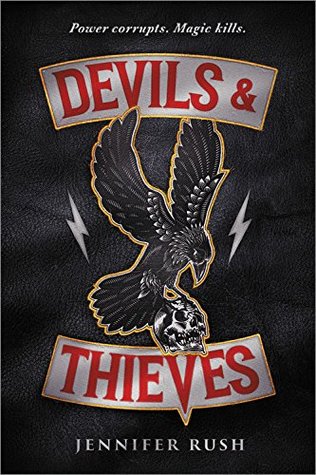Author: Jennifer Rush
Date Read: March 15th 2018
Published: October 3rd 2017 @ Little, Brown
Genre: YA Urban Fantasy
In the small town of Hawthorne, magic is power. Jemmie Carmichael has grown up in Hawthorne all her life as part of the tight knit community of the Devils, a motorcycle club led by the magical Medici family. Unfortunately for her, she can't stand the power that surrounds her: with a kind of synesthesia, Jemmie is able to see and smell different kinds of magic, but the sensations completely overwhelm her, causing her to push away the people she loves and to rely on the charisma and gravity of her best friend to remain invisible. When rival clubs come to town for a yearly festival and people start to go missing, Jemmie must push herself past her limits to protect her friends and to find the truth about just how dangerous magic can be.
So I think it's fair to say that this book was... messy. Tonally unsure of itself, filled with underdeveloped characters and inexplicable girl hate, Devils & Thieves isn't the worst of the Urban Fantasy genre by far, but it does have many of the stereotypical pitfalls. For example, Crowe Medici. His name is Crowe. Medici. If you were to take out every time that Jemmie inexplicably stops what she's doing in order to wax poetic about her attraction to Crowe, you would have a book that is at least 50 pages shorter. There's also this line near the end that actually makes me cringe to think about, where Jemmie literally describes herself as being able to overcome magic because she is "filled with love." This coming from a moody teenager who's spent the entire novel pissed off. Just... yikes.
All that being said, though, I think that this book does have some interesting things to offer and, apart from being compulsively readable, brought up some themes and topics that were engaging for me to think about. Foremost, Jemmie's ability manifesting itself as an incurable illness. Though this definitely wasn't a major theme that was heavily explored throughout the story, I think it did a lot to inform Jemmie as a character, and I think that it was cool that Rush decided to show Jemmie as being sick and angry about it.
Jemmie is, in a lot of ways, deeply unlikeable: she's mean to other girls, she obsesses over a man who treats her like hot garbage, she self-medicates with alcohol, and she's always angry. But this is all wrapped up into this idea that she's dealing with what is essentially a crippling illness through her aversion to magic, because magic surrounds her constantly. It keeps her from doing the things she wants to do, from getting close to people, from being present when she needs to be. And that frustrates her, and it makes her angry. I think oftentimes in media and in literature, you have this idea of the saintly sick person, who handles their illness with grace and works to make everyone else feel more comfortable with their own affliction, and it was a great addition that Rush was willing to make her character flawed in that way.
Like many things in this novel, though, it doesn't quite get there. The issue or theme is sort of presented and then either dropped entirely or quickly resolved. Jemmie is angry because of the illness she's hiding, but when she tells someone, everything is fine. One character is manically in love with another (which wasn't really developed but hey, whatever) but as soon as it's convenient, they're happy to have off with them. Jemmie feels abandoned by her father, who seems to only show interest in her magic and not in her wellbeing, but he said he was sorry, so everything's fine.
Here's the thing, though: I'm pretty well ripping this book apart for its many discrepancies, but at the end of the day, I think that the whole is actually better than the sum of its parts. For all its flaws, this novel was hugely entertaining, and played with elements that I'm personally trash for: blood magic, motorcycle clubs, autumn festivals, demon mirror scenes. I sincerely feel that this series deserves to become a Vampire Diaries-style TV show, with a creative team that can iron out some of the kinks, that keeps all the same beats but then proceeds to go on forever, even through the protagonist abandoning the show. My early teenaged years are a nostalgic time, what can I say?
What I'm trying to say in a roundabout sort of way is that I think it's perfectly valid to acknowledge that something is not high art but still enjoy the hell out of it.



No comments:
Post a Comment